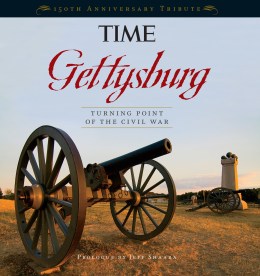
Abraham Lincoln was, on balance, an astute judge of character, but now and then he made a mistake. Unfortunately, during the months that led to Gettysburg, those mistakes involved the commanders of the Army of the Potomac. Everyone remarked on what a splendid army it was, well drilled and copiously supplied, yet no one could lead it to a decisive victory. Now it was summer 1863, and Lee’s rebels were once again marching northward through the picturesque valleys of western Maryland toward Pennsylvania. Lincoln could not afford another mistake.
Ambrose Burnside had been a doozy. What was it about the Rhode Island inventor with the splendidly feline whiskers? Perhaps it was his winning, and entirely justified, modesty that appealed to Lincoln during the summer and fall of 1862, when the President was besieged by regiments of self-promoters. Burnside had, in the early days of the Civil War, a neat little victory to his name—an innovative amphibious assault on Confederate posts along the North Carolina coast—and few Union generals could claim more than that. He took on a high gloss in Lincoln’s eyes; the Commander in Chief pleaded with Burnside to accept command of the Army of the Potomac in place of the maddening, preening George B. McClellan. In November 1862, Lincoln finally turned his request into an order, and Burnside reluctantly embarked on three disastrous months in which he conceived the suicidal plan for the Battle of Fredericksburg, ordered the humiliating and feckless Mud March and provoked a near mutiny among his division commanders.
(PHOTOS: Gettysburg: In the Footsteps of Mathew Brady)
Even then, Lincoln merely reassigned Burnside to a lesser command in Ohio, where the general’s ill-considered crackdown on antiwar protests stirred up a tempest of criticism, leaving Lincoln to ride out the storm. Determined not to repeat his mistake, Lincoln picked his next general with his clear gray eyes wide open. Joseph Hooker was a schemer, and Lincoln knew it. Hooker had a well-founded reputation for backstabbing and loose morals, but as veterans of the carnage at Antietam could attest, the man did not dodge a fight. “Fighting Joe” had his foot just about shot off in the opening hours of that battle, and for months afterward he told everyone who would listen that Lee was able to escape from Maryland only because Joe Hooker couldn’t chase him. It was this show of aggressive spirit that tipped the balance and earned him the top job, but before Hooker got started, Lincoln wanted the general to know that his President had taken his measure.
So he had handed Hooker a brutally candid letter to go with his new command. “I think it is best for you to know that there are some things in regard to which, I am not quite satisfied with you,” Lincoln wrote bluntly. He liked the general’s bravery, his skill, his self-confidence, even his ambition. But Hooker’s insubordination to Burnside had undermined the morale of the entire army, Lincoln scolded. What’s more: “I have heard, in such way as to believe it, of your recently saying that both the Army and the Government needed a Dictator.” Scoffing, Lincoln gave Hooker a dose of his own considerable self-confidence. “Only those generals who gain successes, can set up dictators,” he warned. “What I now ask of you is military success, and I will risk the dictatorship.”
But Lincoln’s eyes were trained on the wrong dangers. Hooker devised a lovely plan for trapping Lee and seizing Richmond, and struck a bold tone when he declared, “May God have mercy on General Lee, for I will have none.” When the outnumbered rebels launched perhaps the most audacious attack of the war, however, the brave and brash Hooker froze like a charmed snake. Apprised of the fact that Lee’s army was scattered through the woods and byways south of the Rappahannock River around Chancellorsville, he lacked the nerve to commit his troops to a decisive battle. Hooker could not even claim credit for the death of Thomas (“Stonewall”) Jackson, the Confederate magician who was mortally wounded at dusk on May 2. Jackson was hit by friendly fire.
Such low moments had become all too familiar for Lincoln, but the bright side of failure was that he had mastered the art of staying cool while people around him panicked. When Lee, after regrouping, pointed his troops northward through the green springtime of early June, Hooker rashly proposed a counterthrust to the south. Lincoln quashed the idea. “I would not take any risk of being entangled upon the [Rappahannock] river, like an ox jumped half over a fence,” he counseled. Lee could hit the Union army on both sides of the stream, and Hooker’s ox was “liable to be torn by dogs, front and rear, without a fair chance to gore one way or kick the other.”
Instead, Lincoln advised Hooker to follow Lee toward Maryland, or Pennsylvania, or wherever he was headed. Confederate incursions into the North were occasions of fear and trembling for most Americans, but for Lincoln, they were bracing opportunities. Lee was sticking his neck out, just as he had done the previous summer, and this meant that Hooker had a chance to do what McClellan had failed to do in September 1862: cut him off. By mid-June, Lee’s Army of Northern Virginia was stretched out from the Rappahannock almost to the Potomac. “The animal must be very slim somewhere,” Lincoln urged. “Could you not break him?”
Yet Hooker was slow to turn his own gaze away from Richmond. Lee’s column flowed onward as he ripened his plans to strike a series of blows in Pennsylvania to break the will of the Northern voters. Meanwhile, he would feed his troops for a while on Northern crops and livestock, giving his battered Virginia homeland a reprieve. At the same time, Confederate Vice President Alexander Stephens sought permission to deliver a peace overture to Washington, hoping to ratchet up pressure for a truce. He was refused.






